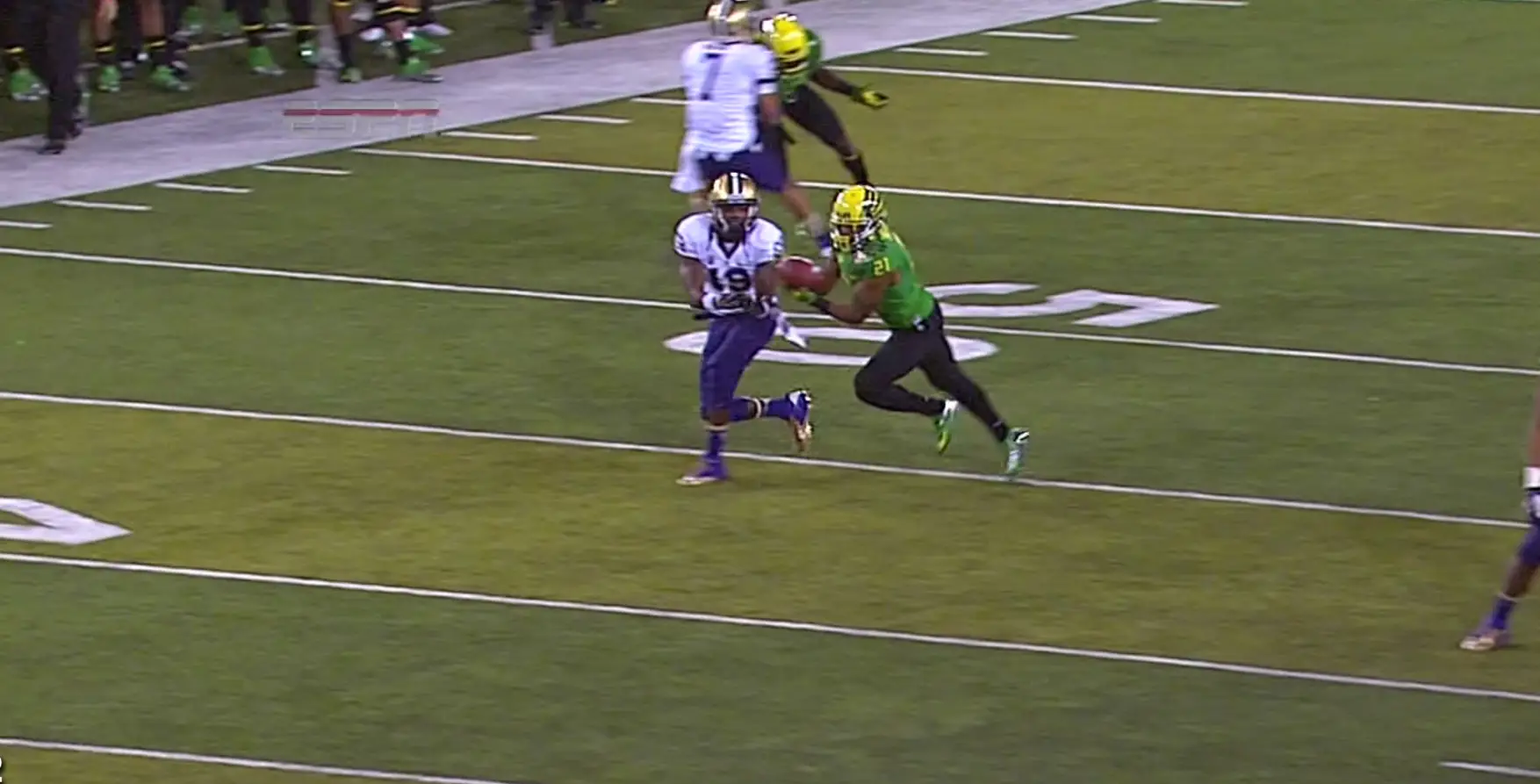My feathered friends…here is stunning back-to-back analysis by guest coaches to build on our understanding of Oregon football. These coaches have personally studied the Ducks on digital and implemented these concepts into their own team’s attack. Today we break down the fascinating coverages that Defensive Coordinator Nick Aliotti utilizes to make Oregon one of the nation’s best defenses at creating turnovers, courtesy of Coach Pettus. This will be in the Defensive Tutorials as it is THAT good! Charles Fischer
How do those Ducks fly around in the Nick Aliotti defense? What defensive strategies do they employ? It all starts with the very unique talents of the Ducks in Oregon’s secondary. Oregon returns a loaded group of defensive backs, thus it will be fun to discover how this special secondary can stop an offense in their tracks, create turnovers and blitz so effectively. Duck fans are in for a treat as we learn how Nick does it!
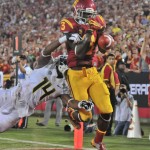
Ifo Ekpre-Olomu
Oregon’s defense, as we have learned earlier in a prior FishDuck.com analysis, plays a seven man front system. Over the years, it has moved seamlessly from a 4-3 to a 3-4 defense. This system can have four defensive linemen and three linebackers or three defensive linemen and four linebackers. This allows for interesting packages within the defensive system and for ways to attack offensive strengths and to utilize defensive strengths.
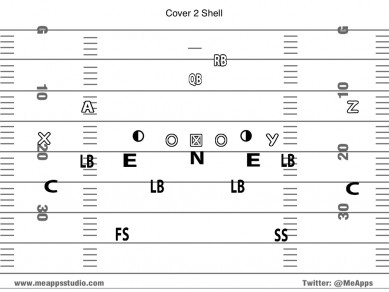
The factor that allows Oregon’s defensive coordinator Coach Aliotti to create blitzes and schemes in the 3-4 system is the consistent look and fundamentally sound secondary play with four defensive backs. The most common starting point of Oregon’s secondary play is the Cover 2 Shell, (above) which includes two high safeties and two corners. General alignments for the safeties are approximately twelve yards deep on the hash. Each corner’s general alignment is anywhere from the line of scrimmage to seven yards off the line of scrimmage and in front of the number one receiver, (the widest split receiver) depending on assignment and split of the wide receiver. These are just general landmarks and simply a starting point, which may change based on coverage and offensive formation.
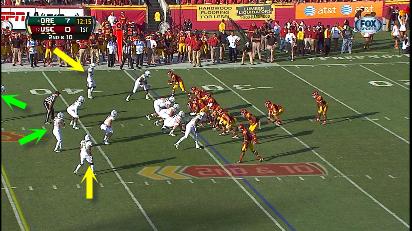
Above is an example of the Cover 2 Shell defensive alignment by Oregon. The corners are marked in yellow and the safeties are marked in green. The alignments are adjusted to match-up against USC’s offensive formation.
Oregon’s defense can give the same look to the quarterback during his pre-snap read when playing a Cover 2 Shell at the beginning of the play. These crucial seconds are when the quarterback is trying to decipher what the defense is attempting to do; he needs to quickly determine the blitzers and the hot reads. The Cover 2 Shell can disguise rushers, allowing Coach Aliotti to run a variety of blitzes from this alignment. This look enables defenses to play different zone coverages to keep the quarterback guessing, which is why zone coverages tend to create more turnovers as the defensive backs are keeping their eyes on the quarterback and ball.
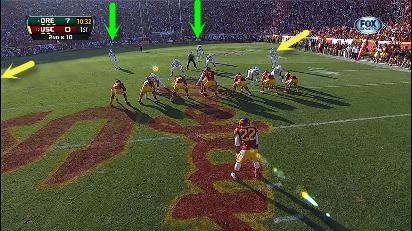
Above is an example of what the quarterback is looking at in his pre-snap read. He is seeing two high safeties (green) in the middle of the field. He also recognizes the corners (yellow) on each side. This is the Cover 2 Shell from the quarterback’s perspective.
Let’s look at the three basic zone coverages that Coach Aliotti utilizes out of the Cover 2 Shell to stop Pac-12 opponents with great success.
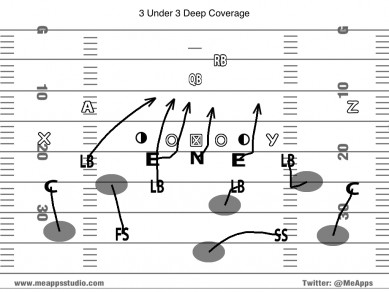
The first look that we will analyze is the 3 Under 3 Deep Coverage above. As discussed in earlier posts on FishDuck, this look can be extremely effective because Coach Aliotti can roll down a safety to replace a blitzer in a “Fire Zone Blitz” and play a Cover 3 (three defensive backs deep) behind it. This is a great way to bring five man pressure and play a fundamentally sound three deep pass coverage. This can be a lot of fun for a coach because he can utilize so many creative ways to bring five man pressure to attack the pass protection or run blocking schemes.
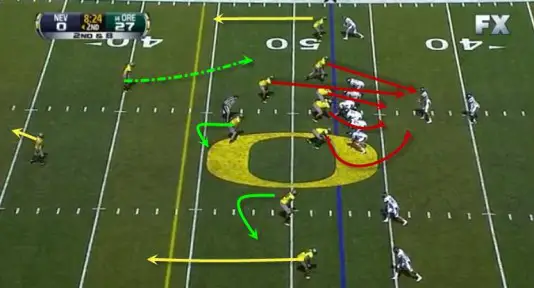
In this look above, Oregon’s safety (dotted green) steps down to play the outside underneath zone on the Fire Zone Blitz side. The other two linebackers (green) have the middle and outside underneath zone with the corners (yellow) and opposite safety (yellow) playing their deep third of the field.
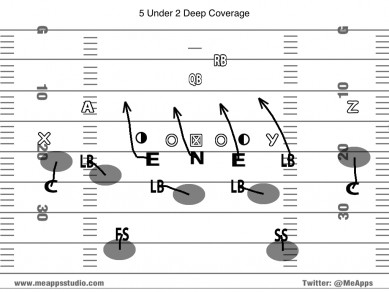
Our next coverage (above) is the classic Cover 2. Coach Aliotti can play the corners hard in a Cover 2 zone scheme and have them aggressively play the outside underneath (short) zones. The safeties would be responsible for their deep half of the field. This scheme is great because you can stop the quick game effectively and rob the shorter, easier throws while bringing a four or five man rush.
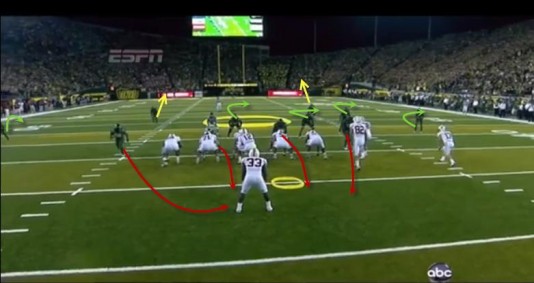
Above is an example of Cover 2 versus a bunch trips formation (three receivers in tight formation together on the right). The Ducks play the five underneath short zones with the linebackers and corners (green arrows) and cover the deep half of the field with two safeties (yellow arrows).
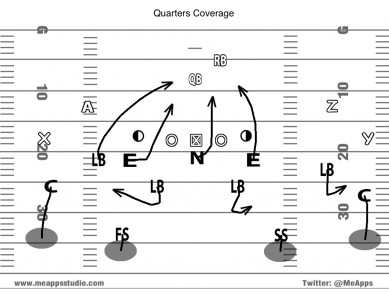
The third zone coverage Coach Aliotti likes to use is a Quarters Coverage where both the corners and safeties are responsible for their deep quarter of the field. The underneath zones are the responsibility of the linebackers or lineman depending on whom you want to blitz. This is a very effective coverage versus deep threats such as four verts, where the offense sends four receivers deep on pass routes. Coach Aliotti usually brings three or four man pressure with this coverage.
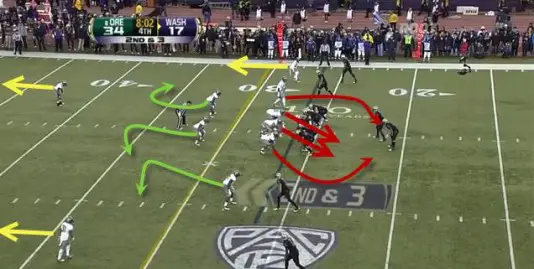
Above Oregon brings their boundary outside linebacker and a four man rush (red). They drop three defenders (green) to their underneath zones, and the corners and safeties (yellow) have their deep quarter of the field (one safety is not visible on the screen).
There are numerous ways which Oregon can play zone coverage out of the Cover 2 Shell, and we have covered three basic and very effective defensive looks the Ducks will show opponents. The trick on defense is to stay relatively simple but make it look complicated. By allowing the secondary to utilize a simple and cohesive system like the Cover 2 Shell, coaches can take away offensive threats and prevent big plays. There are also very creative coverages like Combo and Man coverages, which I will be discussing in my upcoming analyses.
As a coach who loves the 3-4 defense, fundamentally sound secondary play out of the Cover 2 Shell enables the defense to play fast and effectively. I know it can be difficult at times to watch the defensive backs because the typical TV coverage is focused on the front seven, but if you concentrate on the secondary, you can discover an exciting part of the Oregon Ducks’ game. Enjoy and watch those Ducks fly!
Even in Illinois….”oh how we love to learn about your beloved Ducks!”
Cameron Pettus
Head Football Coach
Belleville West High School
Belleville, Illinois
Below is a Tutorial video about Zone coverages as it and over fifty instructional videos can be found in the FishTank Video Archive. Go to the grey tabs at the top and click “Videos” and learn!
ANNOUNCEMENTS
*Don’t miss our football analysis every Tuesday, our Recruiting Update every Wednesday, and our new Chip Kelly updates every Friday!
*If you would like to join the other 80+ volunteers at FishDuck.com, and have five hours a week to donate…we have slots open for Editors, Writers, Analysts, Photo Archivists, and Social Media Associates. Can you help us manage people? Consider our Sales Manager and Video Archive Manager positions. E-mail me at charles@fishduck.com
FishDuck.com was featured in the Washington Post this summer! Read about it here.
Related Articles:
Coach Pettus (Football Analyst) is the head coach and offensive coordinator of the Belleville West Maroons from Belleville, IL. He is a graduate of Millikin University and has coached previously at McKendree University and Paulding County High School. Coach Pettus’ goal is is to inspire his players to be successful by building the skills of hard work, dedication and strong character. He enjoys working the grind, practicing on the grass and building a new team each year. You can follow him on twitter @cameronpettus.

